An NFT game blends traditional gaming with blockchain technology, allowing you to play and earn real-world value through digital assets known as NFTs. In these games, you truly own your assets, which you can trade or sell on blockchain marketplaces. Each game offers unique mechanics and community-driven elements, tapping into your creativity and competitive spirit. You'll find various genres, from RPGs to collectible card games, enhancing your gaming experience. Plus, you can engage with a vibrant community. There's much more to explore about how these games function and benefit players, so stick around for the exciting details!
Key Takeaways
- NFT games are digital games that utilize blockchain technology to provide players with true ownership of in-game assets as non-fungible tokens (NFTs).
- Players can earn real money through play-to-earn models, allowing them to trade and sell their in-game assets on blockchain marketplaces.
- Community engagement is essential, with features like governance, events, and competitions promoting active participation and fostering a vibrant player ecosystem.
- Unlike traditional games, NFT games offer decentralized control, enabling players to influence game development and secure their assets against developer restrictions.
- Market volatility and high transaction fees can pose challenges for players, making it essential to understand the risks associated with NFT games.
NFT Game Fundamentals
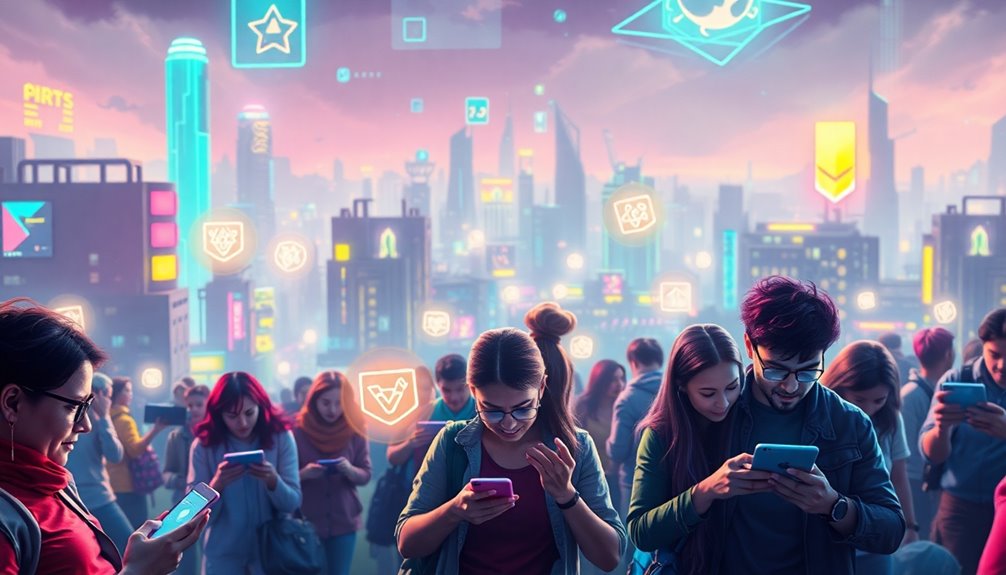
When you're diving into the world of NFT games, it's essential to grasp the core fundamentals that set them apart from traditional gaming.
First, you need to define the game genre—whether it's RPG, strategy, or collectible card games—and identify your target audience.
Research existing games to find inspiration and market gaps, and then develop a unique concept. Decentralized, community-driven elements resonate with players and enhance the appeal of the game.
Visual aspects matter too; focus on 3D modeling, consistent art styles, and a well-crafted Game Design Document.
Integrating blockchain technology enhances transparency and security, while smart contracts manage NFTs.
Finally, create a player-driven economy where users can trade, earn, and own their in-game assets, enabling a rich and engaging experience that traditional games can't offer.
Defining NFT Game Mechanics
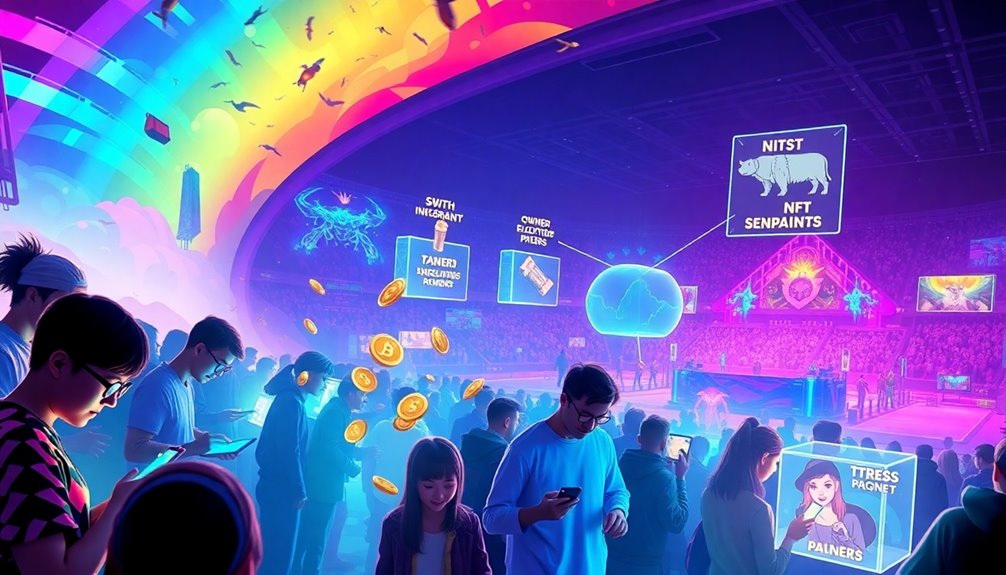
NFT game mechanics form the backbone of an engaging gaming experience, blending unique asset ownership with economic activity.
You typically start by making an initial investment to purchase specific in-game NFT assets, each verified and tradeable on the blockchain. This ownership grants you full control over your assets, allowing you to trade or sell them as you wish.
Ongoing economic activity thrives as developers introduce new NFTs, and you engage in a player-driven economy by negotiating trades. Earning rewards through competition can lead to upgraded NFTs, which you can then sell for real-world income. Additionally, the play-to-earn model allows players to generate income through their gameplay, enhancing the overall experience and incentivizing participation.
With fluctuating values based on demand, these mechanics create a dynamic environment that incentivizes participation and investment in the game.
Gameplay and Blockchain Integration
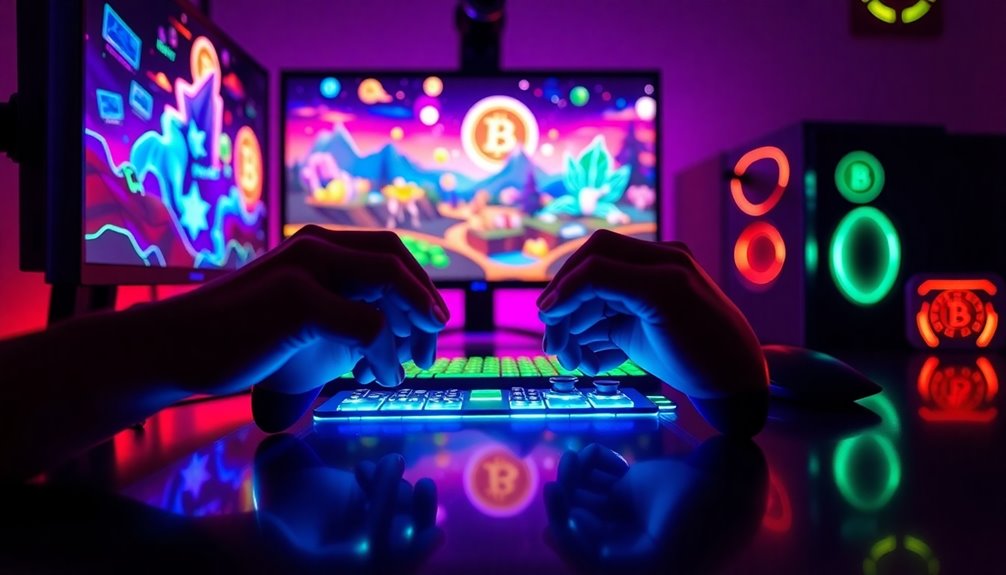
As players engage with NFT game mechanics, the integration of blockchain technology amplifies the gaming experience. Popular blockchains like Ethereum, Solana, and Polygon enhance gameplay by providing secure and scalable solutions. Game developers utilize engines like Unity and Unreal, leveraging plugins such as Enjin's SDK for seamless blockchain integration. Through NFT ownership, players can truly possess in-game assets, distinguishing the experience from traditional gaming. Smart contracts play a crucial role, governing asset functionality and ensuring transactions are securely recorded on an immutable ledger. You'll appreciate the intuitive user interfaces that simplify NFT management, making it accessible even for those new to blockchain. Integrated marketplaces within the game allow for easy trading, while cryptocurrency wallets facilitate smooth transactions, fostering a vibrant player-driven economy that elevates the overall experience.
Pros and Cons Overview
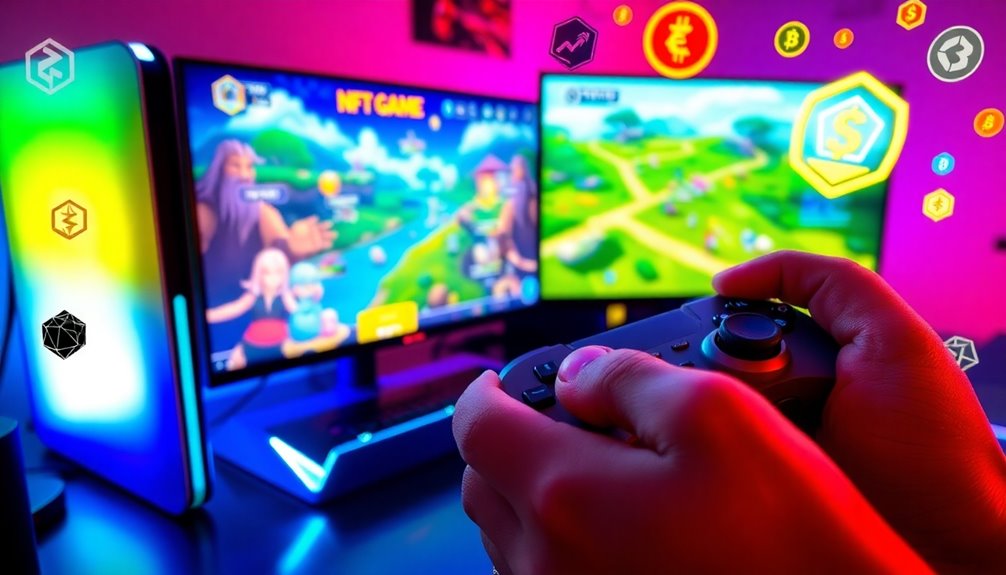
While exploring the world of NFT games, you'll likely encounter a mix of enticing benefits and notable drawbacks.
On the plus side, you can earn real money through play-to-earn models and enjoy verifiable ownership of your digital assets, thanks to blockchain technology. This creates opportunities for trading and generating revenue, while community engagement enhances the overall experience. Additionally, the ability to trade or showcase NFTs fosters a sense of community among players, further enriching the gaming environment.
However, be mindful of the cons. Market volatility can lead to significant losses, and the lack of clear regulations raises legal concerns. High transaction fees and technical risks may pose challenges for newcomers.
Additionally, the uncertain liquidity and investment stability can make navigating the NFT landscape daunting. Balancing these factors is key to making informed decisions in NFT gaming.
NFT Games vs. Traditional Games
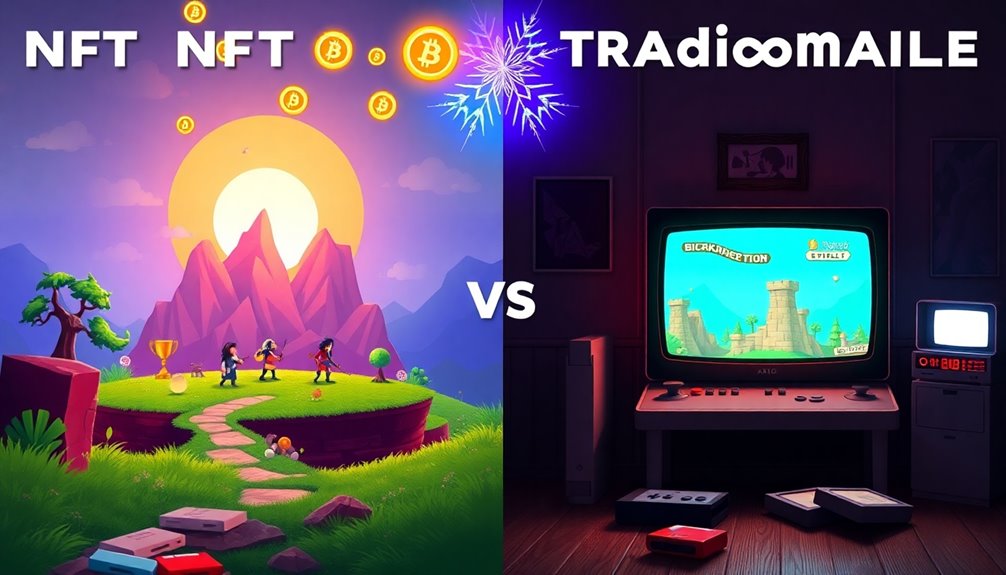
The landscape of gaming is evolving, with NFT games offering distinct advantages and challenges compared to traditional games.
In NFT games, you truly own in-game assets as NFTs, which you can buy, sell, and trade on blockchain marketplaces. This contrasts sharply with traditional games, where developers control assets, preventing transfer or sale. Additionally, these assets can include virtual real estate and digital pets, expanding the range of what players can own. This ownership is facilitated by the use of blockchain technology, which ensures the security and authenticity of the transactions.
Moreover, NFT games are decentralized, enhancing security and player governance, while traditional games are centralized and prone to risks like hacking.
Economically, NFT games operate on a play-to-earn model, allowing you to earn real-world money, unlike traditional games, which focus on pay-to-play.
While NFT games may offer a steeper learning curve, they aim to provide immersive experiences that rival traditional gaming's polished graphics and gameplay.
Market Volatility Concerns
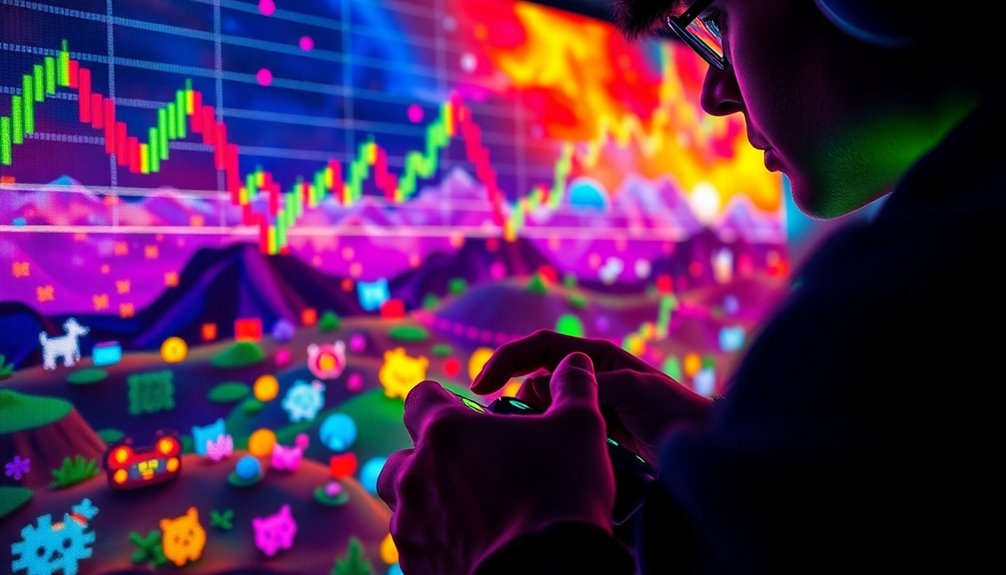
Market volatility in the NFT space can be daunting, especially when values can swing wildly, sometimes spiking by as much as 2,000% in just a few days.
This extreme fluctuation makes it tough to assess an NFT's true worth. You might find yourself at risk of significant financial losses if the market dips suddenly. Factors like inflation and geopolitical tensions only heighten this instability. Additionally, the limited liquidity of NFTs can force you to sell at steep discounts or hold onto assets for too long. High-profile sales can create speculative bubbles, leaving you vulnerable to market manipulation practices like "wash trading." Furthermore, the NFT market's high volatility necessitates careful evaluations to avoid potential financial pitfalls.
It's essential to stay informed and cautious as you navigate this unpredictable landscape.
Emergence of Play-To-Earn Models

NFT games have opened up new avenues for players, particularly through the emergence of play-to-earn (P2E) models. In these games, you engage with blockchain technology and earn rewards like tokens and NFTs simply by playing. These rewards can be sold on exchanges for real money, creating a potential income source. Unlike traditional games, the digital content you earn becomes a digital asset, allowing for economic value generation. While the initial cost to start playing can be high, especially for games like Axie Infinity, many find it worthwhile, especially in low-income regions. The uniqueness of NFTs enhances their value, making them desirable for trading and crafting better in-game assets, ultimately transforming your gaming experience into a viable income stream. This rapid expansion of the P2E sector has led to increased interest from players and developers alike.
Engage With Community Feedback
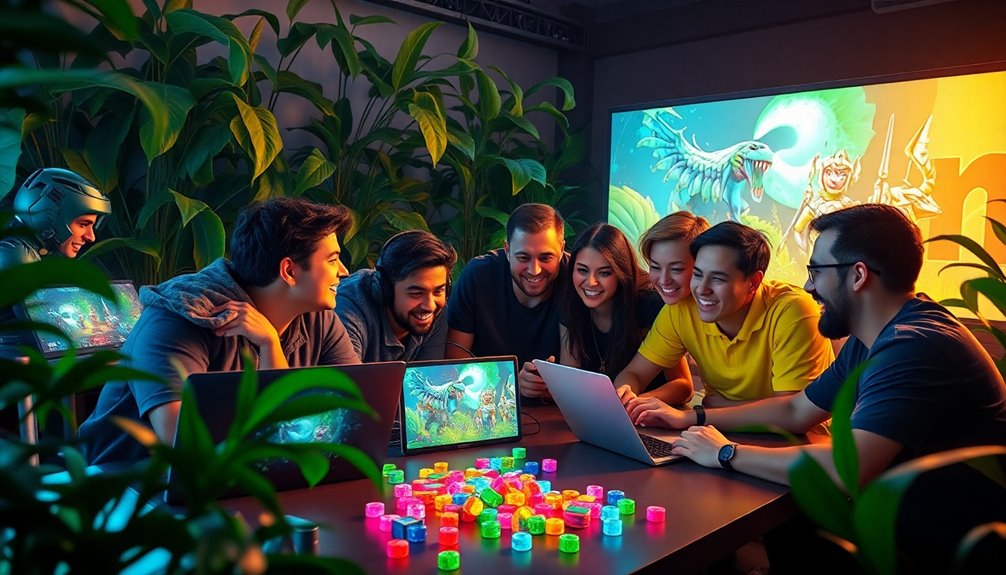
While engaging with community feedback is crucial for any game, it's especially vital in the world of NFT games, where player involvement can shape the experience. You can connect with fellow NFT holders through virtual meetups and AMAs, allowing you to share insights and experiences directly with creators. Participate in events, competitions, and tournaments to keep the excitement alive, as seasonal NFT challenges introduce competitions during specific times, fostering active participation and excitement. Utilize social media to stay updated and interact with the community, while email newsletters can keep you informed about new releases.
Incentivizing your participation with exclusive perks and rewards enhances your engagement. Finally, having a voice in governance through voting empowers you, making you an integral part of game development and community-building efforts.
Frequently Asked Questions
How Do I Get Started With NFT Gaming?
To get started with NFT gaming, first, choose a game that interests you and research its mechanics.
Set up a cryptocurrency wallet to store your NFTs and cryptocurrencies.
Then, consider purchasing your first NFT, as many games require an initial investment.
Join online communities to stay updated and engage with other players.
Finally, start with free-to-play options to gain experience before diving into play-to-earn opportunities.
Enjoy your journey into NFT gaming!
What Wallets Are Compatible With NFT Games?
Imagine diving into a treasure trove of digital riches! To start your NFT gaming adventure, you'll need a compatible wallet.
Popular options include MetaMask, Trust Wallet, and Phantom Wallet. Each one offers unique features and security, ensuring your valuable NFTs are safe.
With these wallets, you can easily buy, sell, and trade your digital assets. So, gear up and choose the wallet that fits your gaming style—the digital realm awaits!
Can I Create My Own NFT Game?
Yes, you can create your own NFT game! Start by developing a unique concept that captures players' interest.
You'll need to understand blockchain technology and choose a platform like Ethereum.
Select a game engine that suits your needs, and integrate NFTs into your gameplay.
Break down the development process into manageable steps, focusing on mechanics and user experience.
Don't forget to test thoroughly to ensure everything works smoothly!
Are NFT Games Safe for Children?
When considering whether NFT games are safe for children, it's essential to weigh the risks.
These games often involve cryptocurrency trading, which can be volatile and lead to financial loss. Additionally, children may face cyber security threats, including scams.
It's crucial to educate them about these risks and maintain parental oversight. Setting spending limits and monitoring their activities can help ensure a safer experience in the gaming world, but caution is always advised.
What Are Common Scams in NFT Gaming?
In NFT gaming, you've got to watch out for several common scams. Scammers often create fake projects, inflating prices to lure you in.
You might encounter phishing attempts, where you're tricked into revealing personal info. Be wary of impersonators on social media and misleading offers that promise high returns.
Lastly, avoid auction scams and exploitative practices that manipulate NFT prices. Staying informed is key to protecting your investments in this space.
Conclusion
So, if you're itching to trade your hard-earned cash for pixelated cats or virtual land, you're in luck! NFT games offer a dazzling mix of blockchain magic and gameplay—just don't forget to check your wallet and your sanity at the door. Who needs a stable job when you can gamble on digital treasures? Embrace the thrill of volatility! After all, why build a future when you can collect shiny tokens and hope for the best? Happy gaming!









